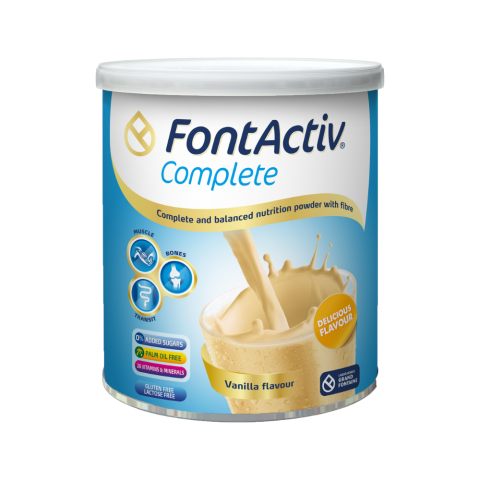
FontActiv Complete
Nutritionally complete formula with 100% whey protein and fiber

Malnutrition is a clinical challenge that goes beyond nutritional insufficiency. It is a complex pathological condition marked by insufficient nutrient intake or suboptimal utilization of nutrients by the body(1,2).
It is a global challenge that affects approximately 9% of the world’s population and manifests itself with severity in the hospital setting, where on average between 20% and 50% of admitted patients present malnutrition or are at risk of developing it during their stay. This condition not only increases morbidity and mortality, but also prolongs the duration of hospitalization and raises care costs by up to 70%(1,2,3).
Early detection and effective treatment of malnutrition are essential to improve the health of patients and the efficiency of our healthcare systems. In this scenario, oral nutritional supplements play a key role, providing essential nutrients in a concentrated and accessible format.
Their adoption in treatment plans not only substantially improves patients’ nutritional status, but also brings with it several key clinical advantages. From reduced complications and decreased hospitalization times to a direct impact on reduced mortality, these supplements stand out as pillars in the process of recovery and improved well-being(2,3).
According to the International Declaration on the Human Right to Nutritional Care, signed during the ESPEN congress 2022 in Vienna, it is universally recognized that every individual has the right to access proper nutrition. The human right to food must be respected in all spheres, including clinical settings, ensuring individuals are fed with dignity and free from hunger. Nutritional therapy, therefore, should be provided by trained healthcare personnel (4).
Certain patient groups are more susceptible to malnutrition, including older adults, especially those in nursing homes or with chronic illnesses. Hospitalized patients, particularly those with severe illnesses, also face increased risk due to factors such as metabolic stress and impaired nutrient absorption. Patients with chronic conditions such as heart failure, COPD, and kidney failure, as well as those with gastrointestinal disorders, are also prone to malnutrition. Identifying and addressing malnutrition in these groups is crucial for optimizing clinical outcomes and improving quality of life(1).
Hospital malnutrition significantly prolongs patient recovery time and elevates the risk of complications and mortality. Malnourished patients endure stays up to 40% longer than well-nourished individuals, with a higher incidence of complications such as pressure ulcers, infections, and falls. In addition, malnourished patients face a mortality risk 2.4 times higher than their well-nourished counterparts. Timely identification and customized nutrition interventions are vital to enhancing outcomes and shortening recovery times(2).
Oral nutritional supplementation is vital in preventing medical complications and conditions, reducing the need for invasive nutrition interventions such as enteral nutrition by tube feeding or parenteral nutrition. By supporting adequate nutrient intake, it maintains digestive system function, avoiding associated complications. This approach ensures essential nutrient provision, preserves gastrointestinal integrity, and mitigates risks such as infections and nutritional deficiencies, particularly in at-risk individuals due to illness or medical treatments(2,3).